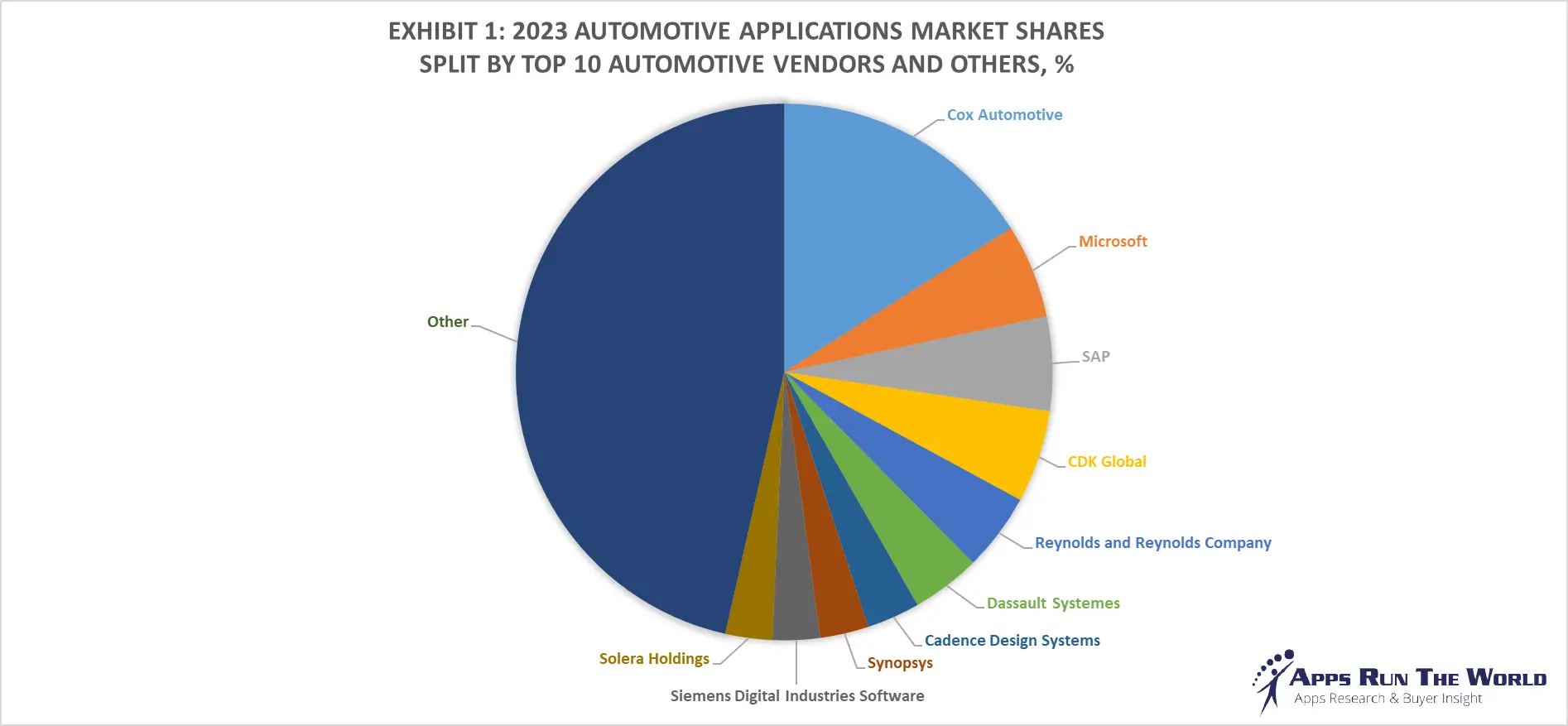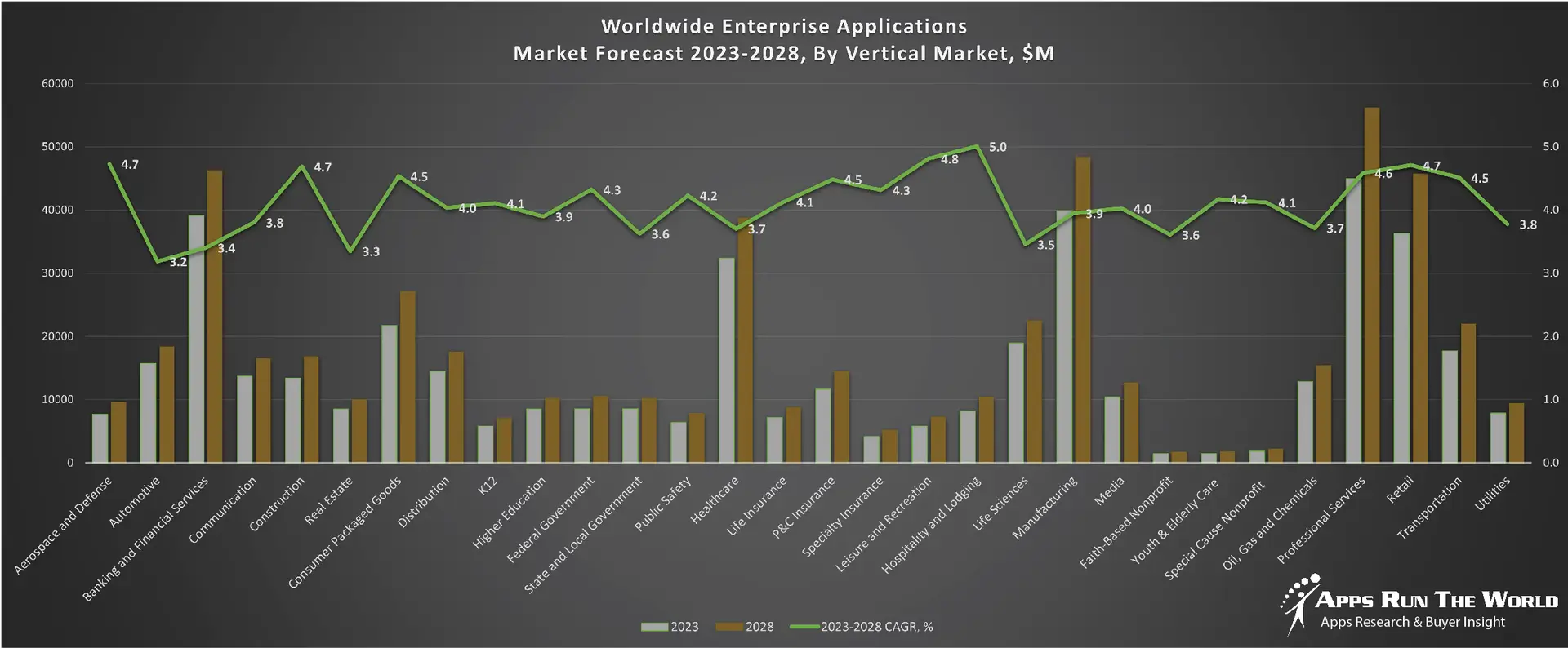In 2023, the global Automotive software market surged to nearly $15.7 billion, growing by 8.1%. The top 10 vendors commanded a significant 53.5% market share, with Cox Automotive leading at 7.1%, followed by Microsoft, SAP, CDK Global, and Reynolds and Reynolds.
Our APPS TOP 500 Market Report (Preview) covers hundreds of Automotive software vendors, offering deep insights into market dynamics, vendor strengths, AI investments, customer momentum, and go-to-market strategies providing valuable perspectives on market trends and challenges.
Discover thousands of Automotive Customer Wins with the ARTW Technographics Platform, an essential resource for technology enthusiasts, sales business leaders, and data-driven marketing executives, offering curated insights into the evolving landscape of the software industry, including the latest developments in the Automotive software market.

Through our forecast period, the Automotive applications market size is expected to reach $18.4 billion by 2028, compared with $15.7 billion in 2023 at a compound annual growth rate of 3.2%.
| Exhibit 2: Worldwide Automotive Software Market 2023-2028 Forecast, $M | |||
|---|---|---|---|
| Year | 2023 | 2028 | 2023-2028 CAGR, % |
| Total | 15733 | 18406 | 3.2% |
Source: Apps Run The World, June 2024
Top 10 Automotive Software vendors
Automotive (Automotive production, equipment, repair, services) – PLM, CAD, CAM, Dealer Management System, Parts Management, Financials, HR, Procurement. Analytics could be the baseline for next-generation automobile apps not just for PLM to manufacture personalized cars, but also self-driving models that redefine transportation. Still supporting operations of global OEMs with unified systems will be top priority for apps vendors
Here are the rankings of the top 10 Automotive software vendors in 2023 and their market shares
| Rank | Vendor | 2021 Automotive Apps Revenues, $M | 2022 Automotive Apps Revenues, $M | 2023 Automotive Apps Revenues, $M | YoY Growth | 2023 Automotive Market Share, % |
|---|---|---|---|---|---|---|
| 1 | Cox Automotive | Subscribe | Subscribe | Subscribe | 4.4% | Subscribe |
| 2 | Microsoft | Subscribe | Subscribe | Subscribe | 3.4% | Subscribe |
| 3 | SAP | Subscribe | Subscribe | Subscribe | 2.0% | Subscribe |
| 4 | CDK Global | Subscribe | Subscribe | Subscribe | 2.9% | Subscribe |
| 5 | Reynolds and Reynolds Company | Subscribe | Subscribe | Subscribe | 1.5% | Subscribe |
| 6 | Dassault Systemes | Subscribe | Subscribe | Subscribe | 8.9% | Subscribe |
| 7 | Cadence Design Systems | Subscribe | Subscribe | Subscribe | 10.0% | Subscribe |
| 8 | Synopsys | Subscribe | Subscribe | Subscribe | 14.6% | Subscribe |
| 9 | Siemens Digital Industries Software | Subscribe | Subscribe | Subscribe | 4.3% | Subscribe |
| 10 | Solera Holdings | Subscribe | Subscribe | Subscribe | 6.2% | Subscribe |
| Subtotal | Subscribe | Subscribe | Subscribe | 4.9% | Subscribe | |
| Other | Subscribe | Subscribe | Subscribe | 12.2% | Subscribe | |
| Total | 13822 | 14549 | 15733 | 8.1% | 100.0% |
Source: Apps Run The World, June 2024
Other Automotive software providers included in the report are: Adobe, ADP, Alfa Financial Software Holdings plc, Altair Engineering, Inc., Ansys Inc., Aptean, ARI Network, Atlassian, AVEVA Group, Bentley Systems Inc., Bynx, Cegedim, Blue Yonder, Cisco Systems, Citrix, CCC Intelligent Solutions, Constellation Software Inc., Descartes Systems Group, Exela Technologies, Inc., GE Digital, GEP Procurement, Google, Hexagon, IBM, IFS, Infor, Intuit Inc., LECTRA, LivePerson Inc., Manhattan Associates Inc., Mitchell International, Inc., Oracle, Open Text Corporation, Palantir Technologies, PTC, QAD Inc., RingCentral, Roper Technologies, Inc., Sage, SAS Institute, ServiceNow, Shopify, SolarWinds, SupplyOn, Solera, Synopsys, Sofico NV, Salesforce.com, The Innovation Group, Trimble, UKG, Verizon Connect, Workday, Yonyou, Zoom Video Communications, and many others.
Custom data cuts related to the Automotive Applications market are available:
- Top 900+ Automotive Applications Vendors and Market Forecast 2023-2028
- 2023 Automotive Applications Market By Functional Market (16 Markets)
- 2023 Automotive Applications Market By Country (USA + 45 countries)
- 2023 Automotive Applications Market By Region (Americas, EMEA, APAC)
- 2023 Automotive Applications Market By Revenue Type (License, Services, Hardware, Support and Maintenance, Cloud)
- 2023 Automotive Applications Market By Customer Size (revenue, employee count, asset)
- 2023 Automotive Applications Market By Channel (Direct vs Direct)
- 2023 Automotive Applications Market By Product
- General Motors, a United States based Automotive organization with 163000 Employees
- Tower Research Capital LLC, a United States based Banking and Financial Services company with 1023 Employees
- Kanematsu Corporation, a Japan based Distribution organization with 8644 Employees
| Logo | Company | Industry | Employees | Revenue | Country | Evaluated |
|---|
Worldwide Enterprise Applications by Vertical Market
Exhibit 3 provides a forecast of the worldwide enterprise applications by vertical market from 2023 to 2028, highlighting market sizes, year-over-year growth, and compound annual growth rates across different industry sectors from Aerospace and Defense to Utilities.
Exhibit 3: Worldwide Enterprise Applications by Vertical Market Forecast 2023-2028 by Functional Market ($M)
Source: Apps Run The World, June 2024
Exhibit 4 shows our projections for the enterprise applications market by vertical segment, based on the buying preferences and the customer propensity to invest in new software within those industries as they continue to upgrade and replace many legacy industry-specific applications that have been identified and tracked in our Buyer Insight Database.

Automotive Software Purchases Win/Loss Analysis As Part Of Enterprise Applications Buyer Insight Customer Database
On the buyer side, customers are investing in Automotive systems based on new features and capabilities that are expected to replace their existing legacy systems. In many cases, competitive upgrades and replacements that could have a profound impact on future market-share changes will become more widespread.
Since 2010, our global team of researchers have been studying the patterns of the latest Automotive software purchases by customers around the world, aggregating massive amounts of data points that form the basis of our forecast assumptions and perhaps the rise and fall of certain vendors and their products on a quarterly basis.
Updated continuously, our database features extensive win/loss analysis. Each year our research team identifies tens of thousands of these customer Automotive wins and losses from public and proprietary sources.
The research results are being incorporated into regular updates in our Enterprise Applications Buyer Insight Customer Database. You can access the Quarterly Win/Loss Analysis Scoreboard and our Enterprise Applications Buyer Insight Customer Database by becoming a subscriber.
Source: Apps Run The World, June 2024
More Enterprise Applications Research Findings
Based on the latest annual survey of 3,000+ enterprise software vendors, Apps Run The World is releasing a number of dedicated reports, which profile the world’s 500 largest Enterprise Applications Vendors (Apps Top 500) ranked by their 2019-2023 product revenues.
Their 2023 results are being broken down, sorted and ranked across 16 functional areas (from Analytics to Treasury and Risk Management) and by 21 vertical industries(from Aerospace to Utility), as shown in our Taxonomy. Further breakdowns by subvertical, country, company size, etc. are available as custom data cuts per special request.
Research Methodology
Each year our global team of researchers conducts an annual survey of thousands of enterprise software vendors by contacting them directly on their latest quarterly and annual revenues by country, functional area, and vertical market.
We supplement their written responses with our own primary research to determine quarterly and yearly growth rates, In addition to customer wins to ascertain whether these are net new purchases or expansions of existing implementations.
Another dimension of our proactive research process is through continuous improvement of our customer database, which stores more than one million records on the enterprise software landscape of over 100,000 organizations around the world.
The database provides customer insight and contextual information on what types of enterprise software systems and other relevant technologies are they running and their propensity to invest further with their current or new suppliers as part of their overall IT transformation projects to stay competitive, fend off threats from disruptive forces, or comply with internal mandates to improve overall enterprise efficiency.
The result is a combination of supply-side data and demand-generation customer insight that allows our clients to better position themselves in anticipation of the next wave that will reshape the enterprise software marketplace for years to come.


